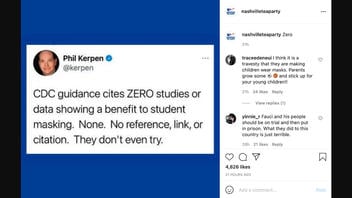
Does the U.S. Centers for Disease Control and Prevention (CDC) guidance cite zero studies or data showing a benefit to student masking? No, that's not true: The CDC website is peppered with references to studies that show mask use by students is associated with lower COVID-19 infection rates. Examples of such studies can be seen here, here, and here and are discussed below.
The claim appeared in an Instagram post (archived here) published on July 19, 2021. The post read:
CDC guidance cites ZERO studies or data showing a benefit to student masking. None. No reference, link, or citation. They don't even try.
Users saw this on social media at the time of writing:
The CDC guidance for COVID-19 prevention in schools is outlined on the agency's website here. Tucked into that guidance is the CDC's recommendation on masks, which is that they should be worn indoors by all individuals, ages 2 and up, who are not fully vaccinated. However, as the CDC notes:
Many schools serve children under the age of 12 who are not eligible for vaccination at this time. Therefore, this guidance emphasizes implementing layered prevention strategies (e.g., using multiple prevention strategies together) to protect people who are not fully vaccinated, including students, teachers, staff, and other members of their households.
One such prevention strategy is consistent and correct mask use. In its guidance, the CDC references various studies that show an association between masking and lower rates of COVID-19 infection.
For example, a study in North Carolina looked at 11 school districts that adhered to multiple prevention strategies, including universal mask use. It reported low school-related transmission and "breaches in mask use likely explained the few instances of in-school spread of SARS-CoV-2," according to the CDC.
A similar study of elementary schools in Utah with high student mask use found low school-related transmission. "These results suggest that when ≥6 ft distancing is not feasible, schools in high-incidence communities can still limit in-school transmission by consistently using masks and implementing other important mitigation strategies," the study concluded.
Finally, a Florida study found higher infection rates were associated with districts with no mask requirement. That study said: "Success in preventing the introduction of SARS-CoV-2 into schools depends upon controlling community transmission and adhering to mitigation measures in schools, particularly masking, physical distancing, testing, and increasing room air ventilation."
Although slightly outside the scope of this fact check, it's worth noting that the American Academy of Pediatrics (AAP) recommends universal masking -- a stricter stance than that taken by the CDC. In a statement released July 19, 2021, the AAP said that everyone, ages 2 and up, should wear masks, regardless of vaccination status. The statement read:
AAP recommends universal masking because a significant portion of the student population is not yet eligible for vaccines, and masking is proven to reduce transmission of the virus and to protect those who are not vaccinated. Many schools will not have a system to monitor vaccine status of students, teachers and staff, and some communities overall have low vaccination uptake where the virus may be circulating more prominently.
Lead Stories reached out to the CDC to ask about the post's claim. We will update this story, as appropriate, if we receive a response.

















